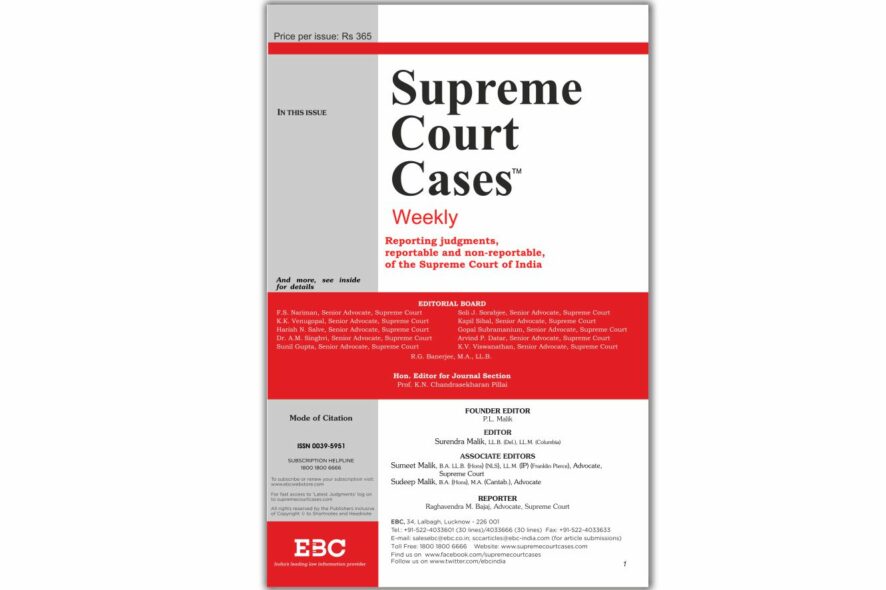Criminal Procedure Code, 1973 — S. 439 — Bail: In this case, application for bail, by petitioner accused, a sitting MP was rejected by Single Judge of High Court. Custodial torture of petitioner was alleged before Division Bench of High Court which directed his medical examination. Both aforesaid orders were challenged. As injuries of petitioner before the Supreme Court were noticed in medical reports, considering totality of facts and circumstances, as well as keeping in view directions issued by Magistrate and also High Court at various stages, appropriate directions were issued by Supreme Court. [Kanumuri Raghurama Krishnam Raju v. State of A.P., (2021) 6 SCC 732]
Energy, Power and Electricity — Electricity — Generation and Transmission/Supply/Distribution of electricity — Power Projects/Supply Obligations/Contract/Licence for Supply of Power/SEZ/Power Purchase Agreements (PPAs)/Dispute Resolution — Power Purchase Agreement (PPA) — Interpretation of: It is well-settled that interpreting a contract court must consider the underlying purpose and intent of contract and in this case the Commission had committed an error in applying Art. 1.2.1(m) when the provision that is applicable is Art. 1.2.1(k) read with definition of month in Art. 21.1. There is a specific mention of “twelve months” in definition of SCOD and Art. 1.2.1(k) categorically provides that any reference to a “month” shall be a calendar month. [Bangalore Electricity Supply Co. Ltd. v. E.S. Solar Power (P) Ltd., (2021) 6 SCC 718]
Environment Law — Environmental Clearance/NOC/Environment Impact Assessment — Expansion of National Highway — Environmental clearance — When necessary — Interpretation of Notis. dt. 14-9-2006 and 22-8-2013: Segmentation of project as a strategy to avoid environmental clearance is not permissible. Project proponent, held, is obligated to obtain prior environmental clearance only if the additional right of way or land acquisition is greater than 40 m on existing alignments and 60 m on realignments or bypasses for a National Highway project which is greater than 100 km. Though, segmentation as a strategy is not permissible for evading environmental clearance as per Notis. dt. 14-9-2006 and 22-8-2013, question of permissibility of the segmentation of a National Highway beyond a distance of 100 km, held, is a matter to be considered by experts. [NHAI v. Pandarinathan Govindarajulu, (2021) 6 SCC 693]
Himachal Pradesh Goods and Services Tax Act, 2017 (10 of 2017) — S. 83 r/w Ss. 62, 63, 64, 67, 73 and 74 — Provisional attachment: The power to levy a provisional attachment has been entrusted to the Commissioner during the pendency of proceedings under Ss. 62, 63, 64, 67, 73 or as the case may be, S. 74. Further, under S. 83(2), a provisional attachment ceases to have effect upon the expiry of a period of one year of the order being passed under S. 83(1). Also, once a final order is passed under S. 74(9), the proceedings under S. 74 are no longer pending as a result of which the provisional attachment must come to an end. [Radha Krishan Industries v. State of H.P., (2021) 6 SCC 771]
Prevention of Money-Laundering Act, 2002 — Ss. 17(1), 17(1-A) & 17(2) r/w Ss. 2(1)(v) and 2(1)(w): Necessary requirements and prerequisites of Freezing of property or record and freezing of bank account, summarized. [OPTO Circuits (India) Ltd. v. Axis Bank, (2021) 6 SCC 707]
SEBI (Mutual Funds) Regulations, 1996 — Regn. 18(15): Expression “consent of the unitholders” means consent of majority of the unitholders who exercise their right in the poll, as opposed to consent of all the unitholders of the scheme. Reading prescription of a quorum as majority of the unitholders or “consent” as implying “consent by the majority of all unitholders” in Regn. 18(15)(c) will not only lead to an absurdity but also an impossibility given the fact that mutual funds have thousands or lakhs of unitholders. Also, many unitholders due to lack of expertise, commercial understanding, relatively small holding, etc. may not like to participate. The underlying thrust behind Regn. 18(15)(c) is to inform the unitholders of the reason and cause for the winding up of the scheme and to give them an opportunity to accept and give their consent or reject the proposal and not to frustrate and make winding up an impossibility. Consent of the unitholders for the purpose of Regn. 18(15)(c) of the 1996 Mutual Fund Regulations means simple majority of the unitholders present and voting, and not majority of all unitholders. [Franklin Templeton Trustee Services (P) Ltd. v. Amruta Garg, (2021) 6 SCC 736]



